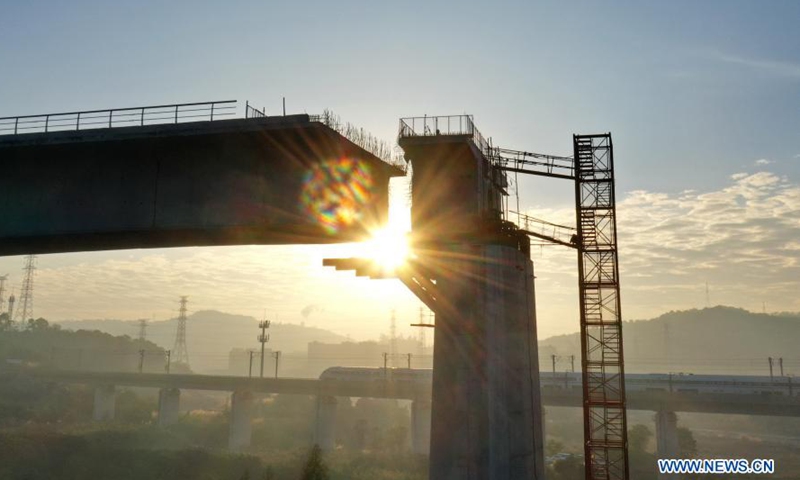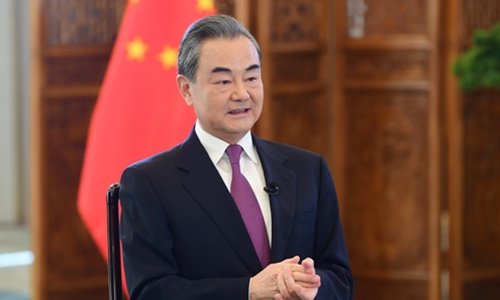Chinese infrastructure firms more scared than hurt in 2020, see surging contracts despite COVID-19 hit
Value of new domestic contracts surges in 2020, several companies successful overseas as well

Aerial photo taken on Jan. 21, 2021 shows a section of the Jiulongjiang Grand Bridge, one part of the Fuzhou-Xiamen Railway which is under construction, completing rotation to its designated position in southeast China's Fujian Province. Photo:Xinhua
China's major infrastructure companies were more scared than hurt in 2020, with some still achieving double-digit growth in new contract values despite the coronavirus pandemic, which interrupted the movement of people and goods.
The better-than-expected outcome was mainly due to the government's stimulus for domestic infrastructure construction as a way to support economic growth, but the continued progress of overseas infrastructure projects, perhaps as a result of joint efforts by China and other countries, also contributed, experts said.
China Railway Group (CRECG) saw the value of its new contracts surge by 20.4 percent on a yearly basis to 2.6 trillion yuan ($401.2 billion), with domestic contracts up 21.2 percent. In particular, the company's value of newly signed railway contacts rose by 14.2 percent year-on-year, while that of highway contracts increased by 32.6 percent, according to a company filing with the Hong Kong Stock Exchange last week.
The China Railway Construction Corp (CRCC) also saw the value of its newly signed engineering contracts rise 28.32 percent on a yearly basis in 2020, with the value of domestic contracts rising by 33.6 percent, per a filing with the Shanghai Stock Exchange over the weekend. In a filing with the Shanghai bourse earlier in January, China State Construction (CSCEC) said new contacts rose by 11.5 percent from one year earlier during 2020.
The rise in domestic contracts came as other pillars of the general economy - trade and consumption - were hit by the coronavirus pandemic.
Many key infrastructure projects also wrapped up in 2020 as Chinese companies accelerated the pace of construction. For example, the Beijing-Xiong'an intercity railway opened to traffic near the end of last year.
Hu Qimu, chief researcher at the Sinosteel Economic Research Institute, told the Global Times that China's emphasis on new infrastructure, and the building of facilities for emerging industries such as 5G and telecom, widened the scope of infrastructure investment while providing more opportunities for traditional infrastructure construction as well.
Besides the solid push on domestic projects, the progress of overseas infrastructure projects by Chinese companies was better than anticipated, and a number of companies still saw the value of overseas new orders rise despite the pandemic.
The CRECG, for example, saw new contracts signed overseas rise by 6.8 percent on a yearly basis to 136 billion yuan, while the volume of newly signed overseas contracts by CSCEC increased by 4.3 percent.
"We won seven bids during a single week in the fourth quarter, at the rate of one contract per day; it was like a dream," one source with CRCC told the Global Times, adding that overseas economies need stimulus, and Chinese companies' build-operate-transfer model is attractive to foreign customers.
Data released by the State-owned Assets Supervision and Administration Commission of the State Council showed that none of the key projects under the Belt and Road Initiative (BRI) had been halted because of the pandemic.
Wang Yiwei, director of the Institute of International Affairs at the Renmin University of China, said that overseas BRI projects are shifting to an asset-light model with secure supply chains due to the impact of the coronavirus. Besides, many overseas countries saw the benefits of railway projects like the China-Europe block train ferry, when air travel was restricted by the pandemic, and this also brought business opportunities for Chinese companies like CRCC.
Hu said that the progress of some overseas infrastructure projects might be a result of government support partly by local authorities that didn't want their economic growth to stop because of the disease. But for purely commercial projects, the impact of the coronavirus should be much greater.
"I believe Chinese companies' infrastructure investment should improve further in 2021 in overseas countries, as the fruits of regional agreements like the Regional Comprehensive Economic Partnership should be reflected in specific contracts, and as the pandemic is to be brought under control with the mass population taking COVID-19 vaccines," he said.
But he forecast that domestic infrastructure investment in 2021 should be of a similar scale as last year.
"China still needs to maintain its strength of infrastructure investment in order to support the economy, particularly as it is expected to tighten monetary policy, but it is unlikely to overdo it considering China's economy is already on a healthy track and the coronavirus has been brought under control."





